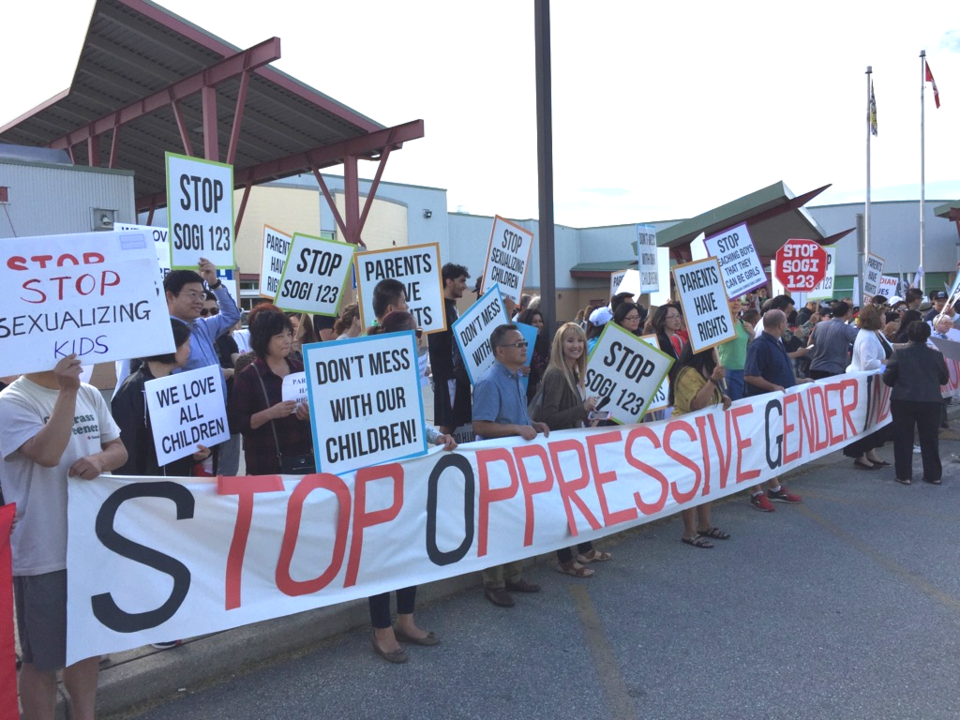Last year’s controversial SOGI policy debate cost some candidates a seat on the school board, while others got elected because of it.
In February 2017, the Richmond Board of Education voted in favour of drafting a special policy to increase their understanding of the Sexual Orientation and Gender Identity (SOGI) policy, a policy aimed at creating a safe and acceptable environment for LGBTQ+ students in schools.
One year later, Sandra Nixon, the school board trustee who advocated for the policy, presented an updated timeline for its implementation.
“The policy will be comprehensive and actionable, offering strong support for an inclusive environment in our schools,” said Nixon.
“Currently, nine school districts in the Lower Mainland have LGBTQ and/or anti-homophobia policies, with Richmond a notable exception.”
In April, the board approved a draft SOGI policy to send to the public for consultation and received around 900 pieces of feedback by June.
The policy was expected to drill home a zero-tolerance attitude against such discrimination and bullying and recognize ways for schools to be more accepting of minority students.
However, the policy, which notes students “have the right to access washrooms, locker rooms and changing facilities that correspond to their gender identity regardless of their legal sex,” was controversial among parents.
In June, around 20 parents gathered before a school board meeting to protest the SOGI policy. The protest was organized by Vancouver-based group Culture Guard and activist Laura-Lynn Thompson, who’ve been protesting province-wide.
On June 27, the SOGI policy was passed by the Richmond Board of Education in a 6-1 decision after an intense, five-hour discussion at Burnett secondary school where more than 600 people, including 90 speakers, attended.
All trustees except Jonathan Ho voted for passing the policy. Ho said more time was needed for more consultations on SOGI given how many parents expressed their concerns.
Alice. S. Wong, trustee at the time, later told the media she opposed the passing of the SOGI policy but voted in favour of it at the meeting “by mistake.”
Supporters said they know students who have been bullied or harassed at school because of their sexual orientation, and that the SOGI policy is urgently needed in Richmond.
But many parents opposed the policy claiming that it will privilege LGBTQ+ groups over others and promote “gender fluidity” among children. Some have accused the school board of “taking away parental rights.”
Trustee Donna Sargent and Nixon said parts of the community have been misinformed about the policy.
Police appeared on the scene towards the end of the meeting when some trustees couldn’t speak due to persistent heckling by people opposed to the policy.
After “feeling disappointed” with the school board’s decision, two parents who opposed the SOGI policy announced that they would run as trustees. They then formed the ‘Parents’ Slate’ with three other trustee candidates who questioned the policy, including Richard Lee, who won seats in the municipal elections.
Meanwhile, seven candidates who support the SOGI policy, including incumbents Sandra Nixson, Ken Hamaguchi and Debbie Tablotney, formed the Richmond Education Party. Four of them were elected as trustees in the October election, with two topping the polls.
Wong and Eric Yung lost their re-election bids.
“(Yung) was a very good chair, but I think he got caught in the whole SOGI thing. He had a lot of pressure on him to take a strong stance against it, yet he supported it, so he was in a no-win situation,” Hamaguchi said.



